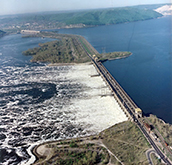Zhiguli Dam
The Zhiguli Hydroelectric Station or Zhigulyovskaya Hydroelectric Station, formerly known as Kuybyshev Hydroelectric Station (Kuybyshev GES) is a large dam and hydroelectric station on the Volga River, located near Zhigulyovsk and Tolyatti in Samara Oblast of Russia. It is the sixth stage of the Volga-Kama Cascade of dams, and the second of them by installed power.
 Construction started in 1950 and was completed in 1957. The complex consists of earth-fill dam, 2800 m long, 750 m wide and 52 m high, concrete spillway dam, 980 m long, power plant house, 700 m long, and two-lane navigable locks. Installed power is 2,477.5 MW, average annual production is 11,700 GWh. The power house has 20 generator units with Kaplan turbines, 1 of 115 MW, 4 of 120 MW and 15 of 125.5 MW at 22.5 m head. The dam forms Kuybyshev Reservoir.
Construction started in 1950 and was completed in 1957. The complex consists of earth-fill dam, 2800 m long, 750 m wide and 52 m high, concrete spillway dam, 980 m long, power plant house, 700 m long, and two-lane navigable locks. Installed power is 2,477.5 MW, average annual production is 11,700 GWh. The power house has 20 generator units with Kaplan turbines, 1 of 115 MW, 4 of 120 MW and 15 of 125.5 MW at 22.5 m head. The dam forms Kuybyshev Reservoir.
The station covers peak loads and maintains frequency stability in the unified power system of Russia (UES), controls flood and maintains navigable waterway. Lower hydroelectric stations are utilised more effectively because of seasonal and over-year regulation provided by the dam. Energy produced by station is transferred by four 500 KV lines - two of them to UES of central Russia and two to UES of the Urals and the Middle Volga. More details
 Construction started in 1950 and was completed in 1957. The complex consists of earth-fill dam, 2800 m long, 750 m wide and 52 m high, concrete spillway dam, 980 m long, power plant house, 700 m long, and two-lane navigable locks. Installed power is 2,477.5 MW, average annual production is 11,700 GWh. The power house has 20 generator units with Kaplan turbines, 1 of 115 MW, 4 of 120 MW and 15 of 125.5 MW at 22.5 m head. The dam forms Kuybyshev Reservoir.
Construction started in 1950 and was completed in 1957. The complex consists of earth-fill dam, 2800 m long, 750 m wide and 52 m high, concrete spillway dam, 980 m long, power plant house, 700 m long, and two-lane navigable locks. Installed power is 2,477.5 MW, average annual production is 11,700 GWh. The power house has 20 generator units with Kaplan turbines, 1 of 115 MW, 4 of 120 MW and 15 of 125.5 MW at 22.5 m head. The dam forms Kuybyshev Reservoir.The station covers peak loads and maintains frequency stability in the unified power system of Russia (UES), controls flood and maintains navigable waterway. Lower hydroelectric stations are utilised more effectively because of seasonal and over-year regulation provided by the dam. Energy produced by station is transferred by four 500 KV lines - two of them to UES of central Russia and two to UES of the Urals and the Middle Volga. More details
